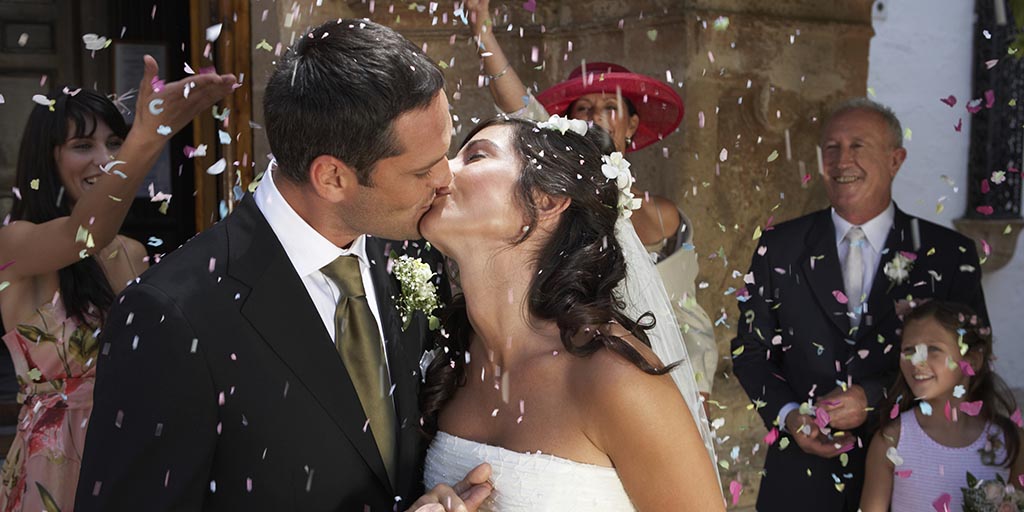Rumours of Grace: Weddings and marriage, are they overrated?
 CREDIT: MARIA TEIJEIRO ON THINKSTOCK
CREDIT: MARIA TEIJEIRO ON THINKSTOCKWeddings are a way to show true love and promise yourself to one another for the rest of your lives, but are they really worth it?
A couple of weeks ago I listened to a middle- aged woman tell the story of the breakup with her husband. He came home one evening and they began talking about going out for supper. Suddenly, he turned to her and said, “I don’t want to go out. I do not want to go out with you tonight. I do not want to go out with you any other night. I am leaving.” Then he said, “Would you like me to leave right now or in a week?”
Because I have worked in and around churches for some years, I have officiated at the weddings of a number of people. They have taken place, often in churches, but sometimes in barns, hotels, museums or backyards. Though most of those couples are still married, some are not. At least one of those marriages ended because of mental health issues that surfaced after the wedding. Another ended when the woman discovered that her husband was pursuing a young girl.
You may have gone through the breakdown of a marriage or a common law relationship. We all know people who have. We all know students who have seen the breakup of their parents. Maybe you are one of those.
We also know the stats. They are not super encouraging for those who are married or who are considering marriage. And sometimes we attend a wedding and wonder if it isn’t all just a little overrated. A wedding can certainly seem stressful, expensive and complicated. Why bother?
One reason some don’t bother has less to do with marriage itself and more to do with the weddings. A wedding can set you back and it can seem like a way of fulfilling a lot of expectations that many don’t want to bother with: the rings, the dresses and tuxes, the venue, the deejay, the photographer, the food, the bar and the bill. It’s not everyone’s cup of tea.
As for a marriage, well, can’t you have all the benefits without the title? Shared finances, living arrangements and a bed, shared transportation and children; you can have all that without a marriage can’t you? Then, if it doesn’t work out, well at least our expectations were lower so the crash won’t be as painful as it could have been. And if there are children involved they can “grow through the divorce experience”.
Finally, in an age of self-expression, marriage can seem constricting. In order to say “yes” to one relationship you end up saying “no” to others. Why not stay open to the possibilities?
For many centuries Jews and Christians have held that marriage is between a man and woman. This is how marriage is pictured in the Jewish Bible.
According to this line of thinking, a marriage is not so much about the two getting married. It is more about accessing two of God’s blessings that are available to the human family: children and the growth of cultured societies. The goal here is relationships that can endure the difficulties in life, that can provide a terrific start for children, and that can be a context for the discovery of many of God’s blessings such as prosperity, health, family and friends; and the discovery of blessings such as fidelity, honesty, patience, trustworthiness, love and hope.
Christianity, which is completely rooted in Judaism (the Jewish faith), inherits this understanding of marriage, family and society from the Jewish Bible. This doesn’t, as far as I am able to understand, mean that Christians should give no consideration to samesex relationships. Many Christians and I do support them. However, in the Jewish and Christian Bibles this view of marriage is the starting point for the understanding of relationships between the sexes and what those relationships can engender.
If a traditional wedding ceremony is not your thing, that is not important, but if God has given you a strong hope of finding a lifelong partner and to raise children of your own, why not follow that path? And if you are able to find a priest, minister or pastor to help you with a wedding, you might end up really appreciating it.
The ceremony does not have to be overly traditional or complicated. A simple one seems to work well for many people. Even that simple ceremony can be an occasion for people to mark that something amazing is happening as you promise to stay with one person. It can give opportunity for prayers. It can give friends and family a chance to celebrate the new stage of your relationship. And it can give you a great start in asking God for the patience, grace, courage and love you will need in the decades to come.
Editorial opinions or comments expressed in this online edition of Interrobang newspaper reflect the views of the writer and are not those of the Interrobang or the Fanshawe Student Union. The Interrobang is published weekly by the Fanshawe Student Union at 1001 Fanshawe College Blvd., P.O. Box 7005, London, Ontario, N5Y 5R6 and distributed through the Fanshawe College community. Letters to the editor are welcome. All letters are subject to editing and should be emailed. All letters must be accompanied by contact information. Letters can also be submitted online by clicking here.














